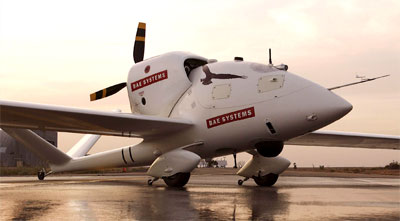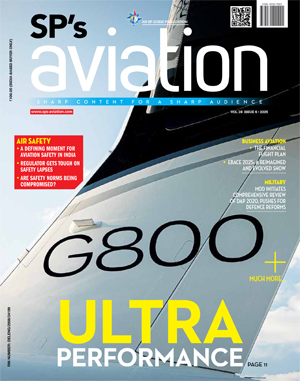INDIAN ARMED FORCES CHIEFS ON OUR RELENTLESS AND FOCUSED PUBLISHING EFFORTS

The insightful articles, inspiring narrations and analytical perspectives presented by the Editorial Team, establish an alluring connect with the reader. My compliments and best wishes to SP Guide Publications.

"Over the past 60 years, the growth of SP Guide Publications has mirrored the rising stature of Indian Navy. Its well-researched and informative magazines on Defence and Aerospace sector have served to shape an educated opinion of our military personnel, policy makers and the public alike. I wish SP's Publication team continued success, fair winds and following seas in all future endeavour!"

Since, its inception in 1964, SP Guide Publications has consistently demonstrated commitment to high-quality journalism in the aerospace and defence sectors, earning a well-deserved reputation as Asia's largest media house in this domain. I wish SP Guide Publications continued success in its pursuit of excellence.
- The layered Air Defence systems that worked superbly, the key element of Operation Sindoor
- Operation Sindoor | Day 2 DGMOs Briefing
- Operation Sindoor: Resolute yet Restrained
- India's Operation Sindoor Sends a Clear Message to Terror and the World – ‘ZERO TOLERANCE’
- Japan and India set forth a defence cooperation consultancy framework, talks on tank and jet engines
OEM Speak - Long Term Business In India

Julian Scopes, President, BAE Systems India speaks to Sangeeta Saxena on the company’s strategies to extend its foothold in India
SP’s Aviation (SP’s): BAE Systems has advocated a lot for a 49 per cent share holding in a joint venture (JV). When do you hope to get it?
Julian Scopes (Scopes): That is for the Government of India to decide. The argument for lifting the cap to 49 per cent is very compelling. For a company keen to invest its capital in India, 26 per cent is not so attractive. We tried for 49 per cent with the Mahindra JV, but it was not accepted. On that occasion, the timing was probably wrong, we were a bit ahead of the curve. The sooner it happens, the better. We create businesses and jobs in the countries we choose to invest in and this is always in agreement with the country and the customer, such as we have done in Australia and the US. India is one of the biggest markets in the world, but when (we are) investing and transferring technology, skills, and so on, the level of return has to be right.
SP’s: Have you been trying to convince the Government of India to a type of “special security agreement” such as you have with the US?
Scopes: I have been trying to promote the concept to the Government of India; it is proven to work well. Our ambition is to grow a long term business here, not just bid for individual programmes.
SP’s: What per cent of the share of revenue generation does BAE System India give to the main company?
Scopes: I cannot give you a figure. Depends on occasional big programmes, like Hawks.
SP’s: Do you plan collaborations with Indian public sector units (PSUs)?
Scopes: We have had a long association with HAL (Hindustan Aeronautics Limited). We are in discussions with BEL (Bharat Electronics Limited). We are also exploring the feasibility with other defence PSUs.
SP’s: Do you plan to collaborate with the Defence Research and Development Organisation and academia?
Scopes: Yes, we hope to.
SP’s: How do you plan to lessen the time lag in the procurement procedure?
Scopes: That is for the Government of India to decide, but their commitment to engage with the industry via the industry bodies is a positive move. There are a lot of difficult challenges to be met. But defence procurement is a complex matter across the world, not just in India. My observation would be that often the requirements are too detailed and mandatory. There should be a hierarchy of requirements—mandatory and desirable. At the moment, they are sometimes too prescriptive. A broader more capability driven view is required. Also the no-cost no-commitment trial needs to be re-evaluated. Joint funding should be looked at.
SP’s: How do you plan to manage the supply chain for spares?
Scopes: Developing a world class supply chain of Indian companies is very much on our agenda. And it will be with global standards of excellence. It’s a challenge and we are hopeful. There is nothing to suggest it cannot be done. There are many high quality engineering companies in India. We are developing our relationships with a whole raft of them. Through-life support is also a fascinating concept and we need to develop it here in India. The concept of managing equipment, through maintenance and upgrades, through the lifetime of that equipment can save the customer a great deal of money, and at the same time increase both availability and capability.
SP’s: What type of export base do you plan to set up in India?
Scopes: Yes, under the aegis of the JV between Mahindra and BAE Systems, which is approved by the FIPB (Foreign Investment Promotion Board), we hope the JV company will develop a successful export business.
SP’s: As a former government employee, are there major differences in the functioning of the British and Indian government?
Scopes: Governments are similar everywhere and there are many similarities in the way the British and Indian governments operate. There are some differences, of course, but the similarities outnumber them considerably. For example, the management and execution of the recent general election was a triumph for India; a procedure many smaller nations in the West would do well to study.
SP’s: BAE Systems has a major thrust on corporate social responsibility. What do you do in India?
Scopes: We are only at the start of developing our corporate responsibility agenda in India. So far, we have adopted a cluster of schools in Bangalore and have a tie-up with some technical universities in Bangalore also. As part of this, we have student and teacher exchange programmes. We try to instill into kids the importance of science and technology and also encourage cultural exchange. We are also looking at how we might expand collaboration in innovation with higher education across the country, but this is at a very early stage. Health and safety is also a key part of our agenda, as are ethical business concepts and behaviour, something the company takes extremely seriously—these are all elements of our corporate responsibility programme.
SP’s: How did you manage recession?
Scopes: The impact of recession in defence and security areas is slightly indirect. General business climate does have an effect, but we have an order book of £45 billion (Rs 3,60,057 crore), so we have a strong outlook. Our supply base is perhaps more affected, and we work closely to manage the impact the general business environment has on our supply base.
SP’s: What is the tie-up between you and MDLR Airlines?
Scopes: MDLR operates a number of our RJ70 regional jets through leasing agreements.
Do you have a JV in the offing with Tata Power?
Scopes: No. There is nothing in the pipeline and we have no MoU. As a matter of interest, we don’t tend to announce MoUs unless we have something concrete to say regarding activities that will happen—many MoUs are usually little more than agreements to talk further. We blow our trumpet a little less than others perhaps. So, you know that when we do, we actually have something meaningful to say.
SP’s: Will Mantis ever be part of the Indian Air force?
Scopes: That would be great. Mantis is still a development programme, of course, but it has great potential. Other autonomous systems, such as HERTI, are ready now and have been deployed in Afghanistan. Our unmanned technologies represent a move to the next generation—autonomous vehicles that carry out whole missions, rather than vehicles in which the pilots just happen to sit elsewhere.
SP’s: Do you have a BAE System in Pakistan in the offing?
Scopes: No.
SP’s: What is the partnership you have with Wipro?
Scopes: We have a joint development centre in Hyderabad working on the development of next generation of flight control and engine management systems for commercial aircraft.
SP’s: What do you plan to name the JV with Mahindra Defence?
Scopes: We will let you know. We are very close to deciding the name.





